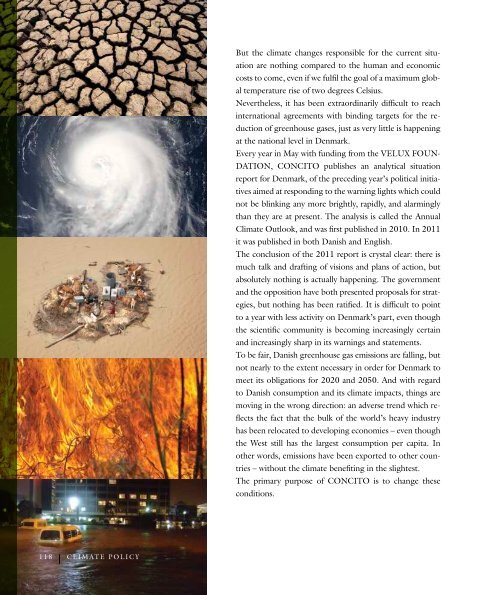Home to the skylark - The Velux Foundations
Home to the skylark - The Velux Foundations
Home to the skylark - The Velux Foundations
Create successful ePaper yourself
Turn your PDF publications into a flip-book with our unique Google optimized e-Paper software.
But <strong>the</strong> climate changes responsible for <strong>the</strong> current situ-<br />
ation are nothing compared <strong>to</strong> <strong>the</strong> human and economic<br />
costs <strong>to</strong> come, even if we fulfil <strong>the</strong> goal of a maximum glob-<br />
al temperature rise of two degrees Celsius.<br />
Never<strong>the</strong>less, it has been extraordinarily difficult <strong>to</strong> reach<br />
international agreements with binding targets for <strong>the</strong> re-<br />
duction of greenhouse gases, just as very little is happening<br />
at <strong>the</strong> national level in Denmark.<br />
Every year in May with funding from <strong>the</strong> VELUX FOUN-<br />
DATION, CONCITO publishes an analytical situation<br />
report for Denmark, of <strong>the</strong> preceding year’s political initia-<br />
tives aimed at responding <strong>to</strong> <strong>the</strong> warning lights which could<br />
not be blinking any more brightly, rapidly, and alarmingly<br />
than <strong>the</strong>y are at present. <strong>The</strong> analysis is called <strong>the</strong> Annual<br />
Climate Outlook, and was first published in 2010. In 2011<br />
it was published in both Danish and English.<br />
<strong>The</strong> conclusion of <strong>the</strong> 2011 report is crystal clear: <strong>the</strong>re is<br />
much talk and drafting of visions and plans of action, but<br />
absolutely nothing is actually happening. <strong>The</strong> government<br />
and <strong>the</strong> opposition have both presented proposals for strat-<br />
egies, but nothing has been ratified. It is difficult <strong>to</strong> point<br />
<strong>to</strong> a year with less activity on Denmark’s part, even though<br />
<strong>the</strong> scientific community is becoming increasingly certain<br />
and increasingly sharp in its warnings and statements.<br />
To be fair, Danish greenhouse gas emissions are falling, but<br />
not nearly <strong>to</strong> <strong>the</strong> extent necessary in order for Denmark <strong>to</strong><br />
meet its obligations for 2020 and 2050. And with regard<br />
<strong>to</strong> Danish consumption and its climate impacts, things are<br />
moving in <strong>the</strong> wrong direction: an adverse trend which re-<br />
flects <strong>the</strong> fact that <strong>the</strong> bulk of <strong>the</strong> world’s heavy industry<br />
has been relocated <strong>to</strong> developing economies – even though<br />
<strong>the</strong> West still has <strong>the</strong> largest consumption per capita. In<br />
o<strong>the</strong>r words, emissions have been exported <strong>to</strong> o<strong>the</strong>r coun-<br />
tries – without <strong>the</strong> climate benefiting in <strong>the</strong> slightest.<br />
<strong>The</strong> primary purpose of CONCITO is <strong>to</strong> change <strong>the</strong>se<br />
conditions.<br />
Pushing <strong>the</strong> boundaries of realpolitik<br />
It all started in November 2007. <strong>The</strong> general election had just been held, and<br />
<strong>the</strong> last ballots were being counted. Martin Lidegaard, who at <strong>the</strong> time had been<br />
a member of Parliament for six years, had not been reelected. Over <strong>the</strong> follow-<br />
ing days, he was approached by a number of businesses and NGOs, encouraging<br />
him <strong>to</strong> start a new, green think tank in Denmark. <strong>The</strong> reasoning was straight-<br />
forward: <strong>the</strong> climate challenge is here <strong>to</strong> stay – and <strong>the</strong>re is a pressing need for<br />
businesses, civil society, and <strong>the</strong> scientific community <strong>to</strong> join forces <strong>to</strong> come up<br />
with concrete options for moving society in a more sustainable direction.<br />
Toge<strong>the</strong>r with <strong>the</strong> author of this article, Martin Lidegaard set <strong>to</strong> work on build-<br />
ing a new think tank from <strong>the</strong> ground up. <strong>The</strong> goal was – and is – <strong>to</strong> ga<strong>the</strong>r <strong>the</strong><br />
best and most influential businesses, organisations, scientists, and individuals in a<br />
network, which is independent of party politics and independent of commercial<br />
interests. <strong>The</strong> former was ensured by a broad membership, <strong>the</strong> latter by <strong>the</strong> bulk<br />
of <strong>the</strong> think tank’s funding being comprised of grants from non-profit founda-<br />
tions.<br />
<strong>The</strong> network outputs scientifically-founded scenarios, which identify ways in<br />
which <strong>the</strong> transport sec<strong>to</strong>r, <strong>the</strong> agricultural sec<strong>to</strong>r, energy production, construc-<br />
tion, and consumption may be developed in a way that is actually sustainable,<br />
i.e. that contributes <strong>to</strong> <strong>the</strong> prosperity of society without destroying <strong>the</strong> resources<br />
upon which that prosperity is based.<br />
No sooner said than done: in September 2008, <strong>the</strong> first 90 members were in<br />
place, and a founding board of direc<strong>to</strong>rs had already drafted articles of associa-<br />
tion for <strong>the</strong> think tank over <strong>the</strong> summer. A grant from <strong>the</strong> Tryg Foundation<br />
and <strong>the</strong> initial membership fees made possible <strong>the</strong> hiring of a managing direc<strong>to</strong>r<br />
and a project manager, as well as a salary for <strong>the</strong> chairman of <strong>the</strong> board. <strong>The</strong><br />
first chairman was Martin Lidegaard, until he was elected Minister of Climate,<br />
Energy and Building in Oc<strong>to</strong>ber 2011.<br />
Since <strong>the</strong>n things have been progressing rapidly: new projects have been com-<br />
pleted with funding from Realdania, <strong>the</strong> Nordea Foundation, <strong>the</strong> Roskilde<br />
Foundation, <strong>the</strong> Percentage Tax Foundation – and especially <strong>the</strong> VELUX<br />
FOUNDATION. Today <strong>the</strong> secretariat employs eight people. Funding from<br />
<strong>the</strong> VELUX FOUNDATION has been of primary importance <strong>to</strong> CONCITO<br />
in 2010 and 2011, since it is due <strong>to</strong> this grant that CONCITO has been able <strong>to</strong><br />
conduct thorough, interdisciplinary analyses of Danish climate policies, just as<br />
it has been possible <strong>to</strong> develop separate analyses of Danish consumer habits. In<br />
o<strong>the</strong>r words, <strong>the</strong> VELUX FOUNDATION is funding CONCITO’s main raison<br />
d’être, and has decided <strong>to</strong> continue until end of 2013.<br />
118 CLIMATE POLICY VILLUM FOUNDATION AND VELUX FOUNDATION 119<br />
ENVIRONMENT AND SUSTAINABILITY



